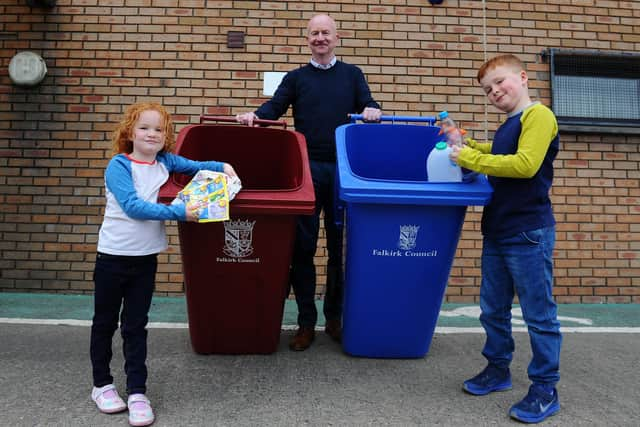Falkirk Council blasted over 'lack of progress' with recycling rates
and live on Freeview channel 276
Scottish Conservative Stephen Kerr Central Scotland MSP, raised concerns after figures published by WasteDataFlow revealed the percentage of rubbish recycled in Falkirk district barely changed between 2012 and 2017, before dropping drastically in 2018.
In 2013, 55.2 per cent of waste was recycled, while the figure dropped to 54.3 per cent the following year.
Advertisement
Hide AdAdvertisement
Hide AdWasteDataFlow data showed 53.9 per cent of rubbish was reprocessed in 2015, compared to 51.3 per cent in 2016, 55.9 per cent in 2017 and 50.8 per cent in 2018.


Mr Kerr has written to Falkirk Council to ask what measures are in place to ensure rates improve.
He said: “Recycling is a crucial part of our work to tackle climate change and improve our local environments.
“We need to know what the council is doing to address the lack of progress. We were told that by reducing green bin pick-ups for landfill, we’d see recycling rates increase. This just hasn’t happened.
Advertisement
Hide AdAdvertisement
Hide Ad“Declaring a climate emergency makes for a good headline but that bold statement needs to be followed up.”
However, Councillor Paul Garner, spokesman for the environment, pointed the finger of blame back at the Tories.
He insists the picture only began to brighten when the SNP took control of Falkirk Council in 2017, with plans firmly in place to continue working towards Scotland’s net zero goals.
Cllr Garner said: “Mr Kerr is correct to question the poor recycling rates between 2012 and 2017.
Advertisement
Hide AdAdvertisement
Hide Ad“Maybe he should direct this at his own Conservative Party council elected members who were in joint administration with Labour during this period.
“With the introduction of the burgundy bin towards the end of 2019, the council became one of nine councils fully aligned to the Zero Waste Scotland Charter, in fact we were the first to sign up.
“Since we took over administration we have continually met targets and in 2019 were 8 per cent above the national average for recycling.
“In 2019 alone, Scotland reduced materials going to landfill by a 735,807 tonnes which is a significant reduction on our way to our net zero targets.
Advertisement
Hide AdAdvertisement
Hide Ad“Going forward, and following a recent analysis of our waste and recyclate streams which identified a significant volume of recycling materials within the general waste bin, a communications strategy is under development.”
Stressing the importance of the council’s five-year litter plan, Cllr Garner added: “The strategy recognises that all elements of society have a role to play in helping keep Scotland beautiful and aims to inform and enable local groups, business and householders to best manage their waste, with increased recycling being a key target.
“A development from the litter strategy is the appointment of an education enforcement officer who will work with all stakeholders to progress behavioural change ensuring the range of recycling bins provided at the kerbside are fully utilised, with minimum resource going to landfill.
“Additionally, the forthcoming national Deposit Return Scheme, which places a financial value on the return of plastic and glass bottles as well as drinks cans, and the Extended Producer Responsibility programme, which encourages producers to reduce the volume of packaging, use of virgin material and making material reusable, will help further reduce waste to landfill and our carbon footprint.”
Thank you for reading this article on our free-to-read website. We're more reliant on your support than ever as the shift in consumer habits brought about by coronavirus impacts our advertisers.
Please consider purchasing a subscription to our print newspaper to help fund our trusted, fact-checked journalism.
Comment Guidelines
National World encourages reader discussion on our stories. User feedback, insights and back-and-forth exchanges add a rich layer of context to reporting. Please review our Community Guidelines before commenting.
